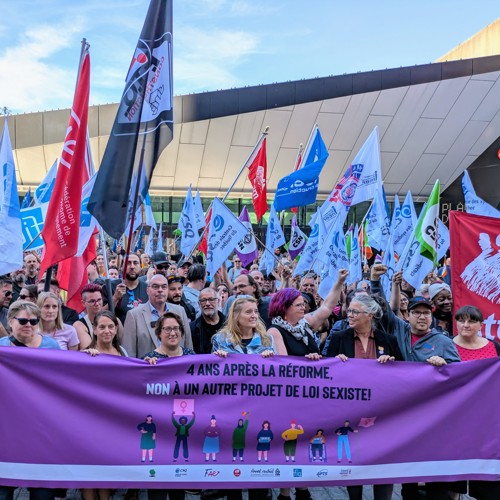Occupational health and safety | Legault government wants to create a sexist and dangerous system for public institutions
October 6, 2025

Montréal – Hundreds of workers protested at lunchtime today in Montréal against the government’s labour relations bill, Bill 101, which is designed to establish a sexist and dangerous occupational health and safety system for people working in health care, social services, and education. The Québec government, which is the biggest employer in the province, is enacting special treatment for itself when it should be leading by example in terms of occupational health and safety. Making every workplace safer in Québec starts with strong, appropriate rules that apply to everyone.
October 6, 2025, is the fourth anniversary of the coming into force of the Act to modernize the occupational health and safety regime, which created prevention and participation mechanisms for all employment sectors in Québec. But hundreds of thousands of workers may not benefit from these mechanisms: the new labour relations bill says that almost all institutions in health, social services and education – institutions whose employees are predominantly female – would no longer be required to provide them.
Quotes
“We’re in the streets today because health and social services workers deserve better. The government had promised solid prevention and participation mechanisms – but now they’re imposing an unfair, discriminatory, two-tier system. We demand genuine prevention that will protect all of the people taking care of Quebecers.”
— Christine Prégent, vice-president, APTS (Alliance du personnel professionnel et technique de la santé et des services sociaux)
“The occupational health and safety regime urgently needs to be reinforced in all work settings. For too long, governments and employers have been focusing on the compensation aspect. They look for ways of saving money in the short term instead of investing in prevention – as if they were doing enough by paying to fix employment injuries. We need to turn this mindset around once and for all and create a strong and assertive culture of prevention. Prevention works when you do it right, and it will keep paying off over the years in both the public and private sectors. And the government, as an employer, should be leading the way and setting an example for others.”
— Luc Vachon, president, CSD (Centrale des syndicats démocratiques)
“So it’s the right thing for all Québec employers – but not for Québec’s biggest employer, the Québec government. If the Legault government doesn’t change course on its labour relations bill, it will be confirming the fact that ours is a sexist government that wants to enact special treatment for itself and will refuse to provide its own workers with the protection granted to others.”
— Caroline Senneville, president, CSN (Confédération des syndicats nationaux)
“With its labour relations bill (Bill 101), the government wants to take us back to a time where women’s jobs mattered less. When you prevent health and education employees – most of whom are women – from fully participating in managing their health and safety at work, you’re creating two categories of workers. Let’s face it: this is discrimination, pure and simple.”
— Nadine Bédard-St-Pierre, first vice-president, CSQ (Centrale des syndicats du Québec)
“Every worker’s health and safety should be valued by the government in the same way, regardless of where they work. But this labour relations bill creates unequal access to prevention and participation mechanisms. It increases the precarity of working conditions for women employed in education, health and social services – predominantly female sectors where there is a high risk of violence and employment injury. The bill will feed and perpetuate systemic discrimination against women. For an organization such as the Fédération autonome de l’enseignement, representing a membership that’s more than 75% women, this is totally unacceptable. The labour minister must withdraw the bill.”
— Mélanie Hubert, president, FAE (Fédération autonome de l’enseignement)
“Women employed in health and social services are among those who are most affected by employment injuries. Reducing prevention mechanisms for them is simply insane – especially since it creates a glaring disparity with other, predominantly male sectors such as construction. The labour relations bill is a major setback for the health and safety of women in the public system, and the FIQ is asking the government to change course immediately.”
— Julie Daignault, OHS vice-president, FIQ (Fédération interprofessionnelle de la santé du Québec)
“The social services sector is where I’m from. And levels of employment injuries are very high in education and health care workplaces. It’s completely unacceptable that the government wants to implement and perpetuate prevention measures that are insufficient. Women make up the majority of employees in these workplaces. Is that why the government is making this choice?”
— Vincent Leclair, general secretary, CRFTQ-MM (Conseil régional de la Fédération des travailleurs et travailleuses du Québec – Montréal métropolitain)
“Bill 101, the labour relations bill, sets up a deeply flawed bargaining process that tramples on the principles of fair and equal mediation to settle cases of employment injury. Thousands of victims of work-related accidents and illnesses will lose their right to compensation or treatment because of the process. That cannot be allowed.”
— Félix Lapan, general secretary, UTTAM (Union des travailleuses et travailleurs accidentés ou malades)
Source:
APTS, CRFTQ-MM, CSD, CSN, CSQ, FAE, FIQ, UTTAM

